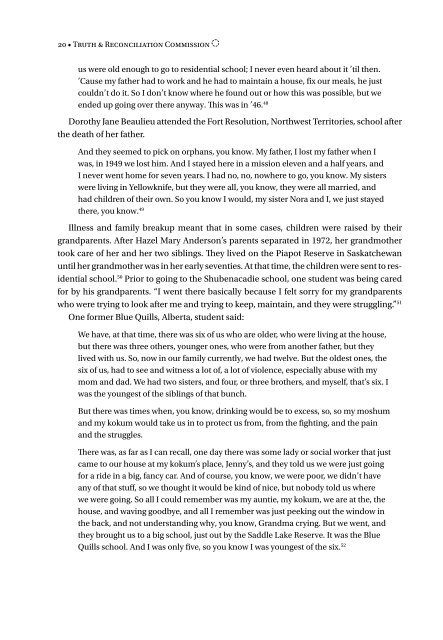The Survivors Speak
1MB8J05
1MB8J05
Create successful ePaper yourself
Turn your PDF publications into a flip-book with our unique Google optimized e-Paper software.
20 • Truth & Reconciliation Commission<br />
us were old enough to go to residential school; I never even heard about it ’til then.<br />
’Cause my father had to work and he had to maintain a house, fix our meals, he just<br />
couldn’t do it. So I don’t know where he found out or how this was possible, but we<br />
ended up going over there anyway. This was in ’46. 48<br />
Dorothy Jane Beaulieu attended the Fort Resolution, Northwest Territories, school after<br />
the death of her father.<br />
And they seemed to pick on orphans, you know. My father, I lost my father when I<br />
was, in 1949 we lost him. And I stayed here in a mission eleven and a half years, and<br />
I never went home for seven years. I had no, no, nowhere to go, you know. My sisters<br />
were living in Yellowknife, but they were all, you know, they were all married, and<br />
had children of their own. So you know I would, my sister Nora and I, we just stayed<br />
there, you know. 49<br />
Illness and family breakup meant that in some cases, children were raised by their<br />
grandparents. After Hazel Mary Anderson’s parents separated in 1972, her grandmother<br />
took care of her and her two siblings. <strong>The</strong>y lived on the Piapot Reserve in Saskatchewan<br />
until her grandmother was in her early seventies. At that time, the children were sent to residential<br />
school. 50 Prior to going to the Shubenacadie school, one student was being cared<br />
for by his grandparents. “I went there basically because I felt sorry for my grandparents<br />
who were trying to look after me and trying to keep, maintain, and they were struggling.” 51<br />
One former Blue Quills, Alberta, student said:<br />
We have, at that time, there was six of us who are older, who were living at the house,<br />
but there was three others, younger ones, who were from another father, but they<br />
lived with us. So, now in our family currently, we had twelve. But the oldest ones, the<br />
six of us, had to see and witness a lot of, a lot of violence, especially abuse with my<br />
mom and dad. We had two sisters, and four, or three brothers, and myself, that’s six. I<br />
was the youngest of the siblings of that bunch.<br />
But there was times when, you know, drinking would be to excess, so, so my moshum<br />
and my kokum would take us in to protect us from, from the fighting, and the pain<br />
and the struggles.<br />
<strong>The</strong>re was, as far as I can recall, one day there was some lady or social worker that just<br />
came to our house at my kokum’s place, Jenny’s, and they told us we were just going<br />
for a ride in a big, fancy car. And of course, you know, we were poor, we didn’t have<br />
any of that stuff, so we thought it would be kind of nice, but nobody told us where<br />
we were going. So all I could remember was my auntie, my kokum, we are at the, the<br />
house, and waving goodbye, and all I remember was just peeking out the window in<br />
the back, and not understanding why, you know, Grandma crying. But we went, and<br />
they brought us to a big school, just out by the Saddle Lake Reserve. It was the Blue<br />
Quills school. And I was only five, so you know I was youngest of the six. 52


